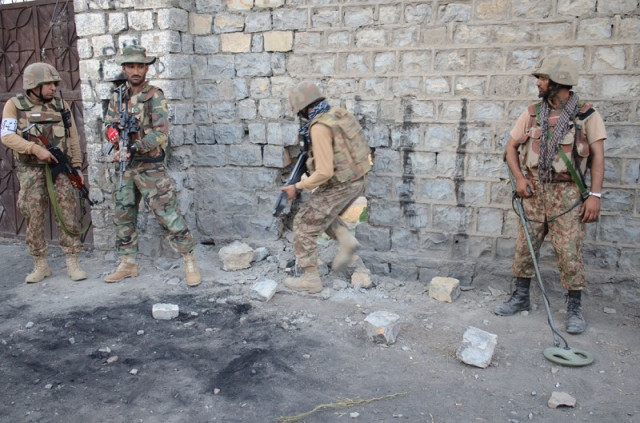‘This is the first war where casualties are civilians, cops’
CRSS research fellow finds that Karachi witnessed the most violent deaths in 2014

Nafees pointed out that 7,560 people were killed in 2014 while 3,946 others were injured. PHOTO: ISPR/EXPRESS FILE
Muhammad Nafees, a senior research fellow at the Centre for Research and Security Studies, was presenting the findings of his report on the country's security situation and Operation Zarb-e-Azb at the Human Rights Commission of Pakistan's office on Friday. Later in the day, militants abducted passengers from a bus in Mastung, killing at least 22 of them.
"There has been a change in the strategy adopted by the militants after Zarb-e-Azb," Nafees believed. "They have started attacking soft targets, such as women and children, with the highest number of children being killed in the Peshawar school attack in December.
Examining terrorist and militant attacks, sectarian violence, crime, targeted killings, security operations and drone strikes, he found that Karachi, with 2,029 casualties, was the district with the most violence-related deaths in 2014, followed by North Waziristan and Khyber Agency. Meanwhile, Sindh is fourth when it comes to terrorism-related fatalities, being surpassed by the Federally Administered Tribal Areas (Fata), Khyber-Pakhtunkhwa and Balochistan.
"It will soon be a year since Operation Zarb-e-Azb started. The places may be changing but the people are still dying," Nafees pointed out, revealing that 7,560 people were killed in 2014 while 3,946 others were injured. "Pakistan is probably the only country that is fighting a war within while not having good relations with its neighbours."
According to him, the most significant spike in violence was witnessed in Fata, where the number of casualties rose from 1,457 in 2013 to 3,400 in 2014, largely due to the military operation.
He also claimed that members of the Ismaili, Bohra, Sikh and Zikri communities became targets in the last year, as did people, such as volleyball players, football players and social activists. "The political and religious parties condemn violence but their workers are still involved in it," said Nafees, pointing out that 81 Muttahida Qaumi Movement activists were killed in 2014 — more than any other political party. "Maulana Abdul Aziz openly supported the Army Public School attack but is still roaming free."
Published in The Express Tribune, May 31st, 2015.



















COMMENTS
Comments are moderated and generally will be posted if they are on-topic and not abusive.
For more information, please see our Comments FAQ